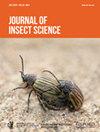Measuring factors affecting honey bee (Hymenoptera: Apidae) attraction to soybeans using bioacoustics monitoring
IF 2.1
3区 农林科学
Q1 ENTOMOLOGY
引用次数: 0
Abstract
Soybean (Glycine max (L.) Merr.) is an important agricultural crop around the world, and previous studies suggest that honey bees (Apis mellifera Linnaeus) can be a component for optimizing soybean production through pollination. Determining when bees are present in soybean fields is critical for assessing pollination activity and identifying periods when bees are absent so that bee-toxic pesticides may be applied. There are currently several methods for detecting pollinator activity, but these existing methods have substantial limitations, including the bias of pan trappings against large bees and the limited duration of observation possible using manual techniques. This study aimed to develop a new method for detecting honey bees in soybean fields using bioacoustics monitoring. Microphones were placed in soybean fields to record the audible wingbeats of foraging bees. Foraging activity was identified using the wingbeat frequency of honey bees (234 ± 14 Hz) through a combination of algorithmic and manual approaches. A total of 243 honey bees were detected over 10 days of recording in 4 soybean fields. Bee activity was significantly greater in blooming fields than in non-blooming fields. Temperature had no significant effect on bee activity, but bee activity differed significantly between soybean varieties, suggesting that soybean attractiveness to honey bees is heavily dependent on varietal characteristics. Refinement of bioacoustics methods, particularly through the incorporation of machine learning, could provide a practical tool for measuring the activity of honey bees and other flying insects in soybeans as well as other crops and ecosystems.利用生物声学监测测量影响蜜蜂(膜翅目:鳞翅目)吸引大豆的因素
大豆(Glycine max (L.) Merr.)是全球重要的农作物,以往的研究表明,蜜蜂(Apis mellifera Linnaeus)可以通过授粉优化大豆生产。确定蜜蜂何时出现在大豆田中,对于评估授粉活动和确定蜜蜂缺失期以便施用蜂毒杀虫剂至关重要。目前有几种检测授粉者活动的方法,但这些现有方法有很大的局限性,包括盘式诱捕器对大型蜜蜂的偏差,以及使用人工技术进行观察的时间有限。本研究旨在开发一种利用生物声学监测来检测大豆田蜜蜂的新方法。在大豆田中放置麦克风,记录觅食蜜蜂的振翅声。通过算法和人工相结合的方法,利用蜜蜂的振翅频率(234 ± 14 Hz)来识别蜜蜂的觅食活动。在 4 块大豆田进行的 10 天记录中,共检测到 243 只蜜蜂。蜜蜂在开花田块的活动明显多于未开花田块。温度对蜜蜂活动没有明显影响,但不同大豆品种的蜜蜂活动有显著差异,这表明大豆对蜜蜂的吸引力在很大程度上取决于品种特性。生物声学方法的改进,特别是通过机器学习的结合,可以为测量蜜蜂和其他飞虫在大豆以及其他作物和生态系统中的活动提供一种实用工具。
本文章由计算机程序翻译,如有差异,请以英文原文为准。
求助全文
约1分钟内获得全文
求助全文
来源期刊

Journal of Insect Science
生物-昆虫学
CiteScore
3.70
自引率
0.00%
发文量
80
审稿时长
7.5 months
期刊介绍:
The Journal of Insect Science was founded with support from the University of Arizona library in 2001 by Dr. Henry Hagedorn, who served as editor-in-chief until his death in January 2014. The Entomological Society of America was very pleased to add the Journal of Insect Science to its publishing portfolio in 2014. The fully open access journal publishes papers in all aspects of the biology of insects and other arthropods from the molecular to the ecological, and their agricultural and medical impact.
 求助内容:
求助内容: 应助结果提醒方式:
应助结果提醒方式:


